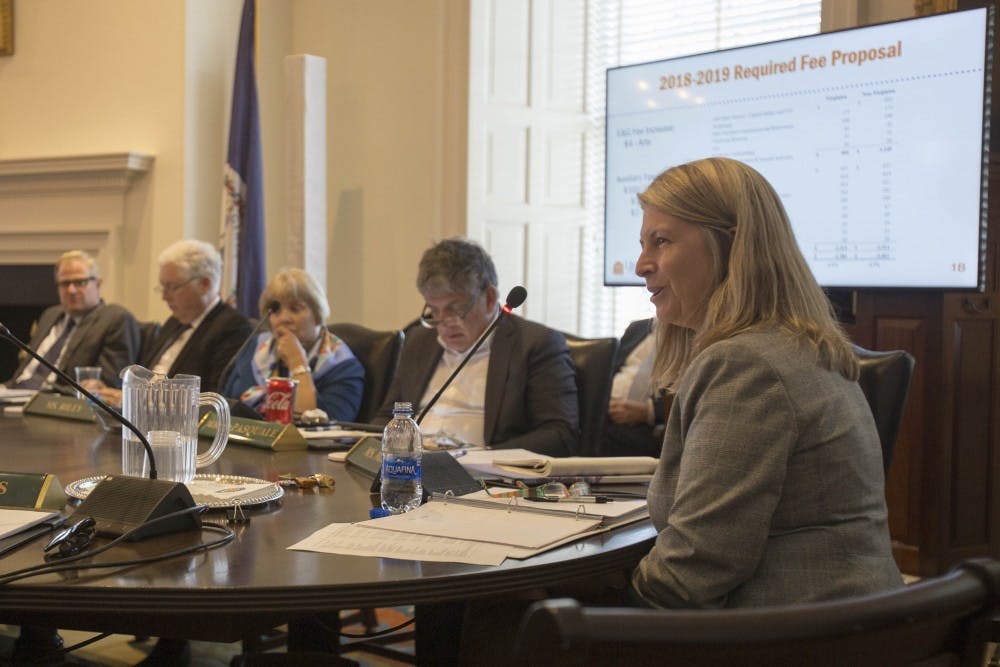The University Board of Visitors Finance Committee endorsed a proposal Thursday to increase tuition rates for the 2018-19 school year. For most undergraduate schools, the Board voted to support a 2.5 percent raise for returning in-state students and 3.5 percent for out-of-state students. The full Board will vote Friday on whether to implement the tuition increases.
The University's in-state tuition will be the third-highest of state schools in Virginia behind William and Mary and Virginia Military Institute.
The increases vary across schools between 2.5 and 17.5 percent.
Outside the Rotunda, a group of about 30 students protested the increase by reading statements aloud that expressed their disagreement with the proposal. The protest was organized by the Black Student Alliance, Minority Rights Coalition, UFUSED and the University’s chapter of the National Association for the Advancement of Colored People.
According to the Facebook event, the protest was meant to inform the Board of students’ opinions of the proposed increases and how those increases would affect African-American and Latinx families.
“I understand that there needs to be a commitment to people in the state because it’s a public university but I love this school as much as anyone else,” one of the protesters, an out-of-state student, said at the protest. “I can barely afford that as it is.”
With recent consecutive increases in tuition each year, some students expressed concerns about when such increases will end.
“Where exactly does it stop?” another protester said. “Is it in 10 years when I don’t even attend this university?”
Entering in-state undergraduates in the College and the Curry school will see a tuition increase of $334. Out-of-state undergraduates in these schools will see an increase of $1,530.
Tuition for in-state students entering the Architecture school will increase by $1,334 and $2,530 for out-of-state students. However, a $500 fee for these students will be eliminated.
In-state students entering the Nursing school will see tuition increase by $2,334. The increase for out-of-state students will be $3,530. The Nursing school faces the largest tuition increases out of all schools.
Tuition for the Engineering school will increase by $1,436 for in-state students and $2,674 for out-of-state students.
Entering undergraduates in the Batten school will see a tuition increase of $2,128 for in-state students and $3,378 for out-of-state students.
In-state students entering the Commerce school will see a tuition increase of $2,962, and tuition will increase by $4,212 for out-of-state students.
Melody Bianchetto, University vice president for finance, said this will be the third-consecutive year the increase is below the inflation rate, a goal the committee has been very intentional to keep.
The finance committee also voted to raise fees by a total of $110, including a $101 raise in student health fees in order to meet the growth of Student Health and Wellness. However, Bianchetto noted this is the second consecutive year there will not be an increase in athletic fees.
Bianchetto said these raises in tuition are due to addressing clinical requirements in the medical-oriented schools and working to recruit and retain faculty members. In order to keep the balance between affordability and excellence, the Board sees these changes as necessary.
Bianchetto stressed the University’s commitment to meet 100 percent of students’ need in financial aid, so as the tuition goes up, so does the financial aid.
Bianchetto said the University is implementing more outreach programs to low-income high schools and to first- and second-year students interested in applying to the Batten and Commerce schools. These programs will help inform prospective students of what University President Teresa Sullivan called University’s “generous financial aid package.” Additionally, the University has seen more early acceptances, allowing the financial aid office to distribute financial aid packages quicker.
Maurice Jones, Board member and finance committee member, questioned how this increase would affect the diversity in the student population. John G. Macfarlane III, Board member, finance committee member and chairman of the committee on the University’s College at Wise, referenced increases in the past years, showing a sizable increase in both African-American applicants and enrolled students, as well as increases in other minority students, first-generation students and students requesting financial aid over the past few years.
Additionally, the Board voted to support the finance committee’s request for authorization for capital investments in the University Foundation. Patrick Hogan, executive vice president and chief operating officer of the University, said the Foundation has “maxed” its funds and needs these additional investments to continue Unversity projects such as the Brandon Avenue master plan, Emmet/Ivy corridor, North Research Park and Ivy Gardens Apartments. The Board agreed investments shall not exceed $100 million.
Hogan proposed the financial plans for the Student Health and Wellness Center and McIntire School of Commerce Academic Facility, which entails renovations to Cobb Hall. Board member and Finance Committee Chairman James B. Murray, Jr. said this plan’s approval was crucial, considering the need to reassure an anonymous donor of $15 million to Student Health that the University plans to move forward on the project. The Board voted to support the financial plans for both facilities.
The Board heard reports about ResearchUVA, which recently adopted the program “Juice.” The program allows the University to track grant proposals submitted, enabling the administration to see what types of grants are awarded and where their greatest progress is.
Hogan closed with few remarks informing the Board of topics to be discussed in the May meeting, including cost estimates of the expansion of residential halls and offering housing to all second-year students.







